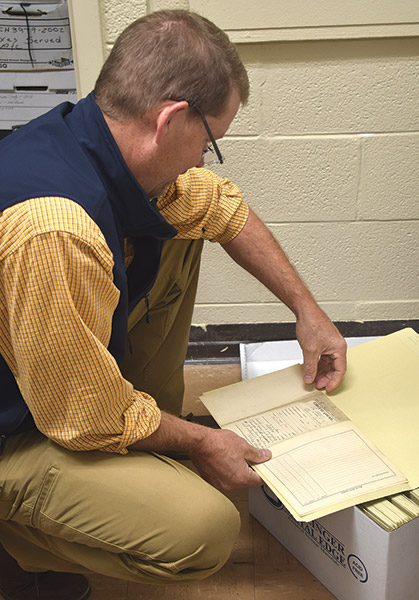Let there be structure
Circuit Court clerks’ office makes a better filing system
Put together a combination of space, a need of structure, and loads of time and the final outcome is a new filing system for the Anderson County Circuit Court Clerks’ office.
Rex Lynch, Circuit Court clerk, announced last week completion of new, state-of-the-art filing equipment for the archived records generated from his office.
Many of the records are permanent and can never be destroyed, while others must be maintained for at least 10 years.
“Civil cases have to be kept for 10 years; DUI cases for 20, and other criminal cases have to be kept forever,” Lynch said.
Lynch said hopefully the state legislature will, at some point, look at this mandate and change it.
As an example, Lynch pulled paper work from a case in the 1920s. It si very unlikely anyone will ever need that paperwork again. Still, Circuit Court Clerks across the state have to keep these records.
Lynch said the space afforded with the county’s acquisition of the old Emory Valley School building has helped.
“And I’m an engineer. I want that structure,” he said.
“When I took office, General Sessions Division 2 records were unorganized and scattered in multiple locations. Much of the files were recklessly laying in random stacks on open tables, some stored in old liquor boxes, and others just piled in the floor. At times it took hours or days to locate files”, stated Lynch.
Two high density mobile filing systems were installed in the General Sessions Division 2 office building. Archived files from Criminal Court, Juvenile Court, and General Sessions Court will be filed in them. All the records had to be re-boxed, categorized, labeled, and placed in acid free boxes for their protection.
There was a total of 1,615 boxes of records and 632 minute books that were initially placed in the new filing system. There is at a minimum at least 20 years worth of records that can be added to this filing system.
“Records are now safe, secure, and easily located”, stated Lynch.
And these records have also been scanned, he noted. If, at some point, the state says digital copies of records are acceptable his office has a leg up.
“When we shut down because of COVID we had to keep working. The timing of this filing system hit just right. I had the whole staff sitting at their desks scanning documents and saving them,” he said.
For now, those scanned documents aren’t really worth much, but if the State Legislature ever decides it’s okay to shred paperwork from cases in the 1920s …
“Some of the older files are hard to deal with,” Lynch noted. “The paper is so brittle it’s hard to work with them.”
Lynch said his staff did a “great job” scanning and filing.
Now there is structure.






